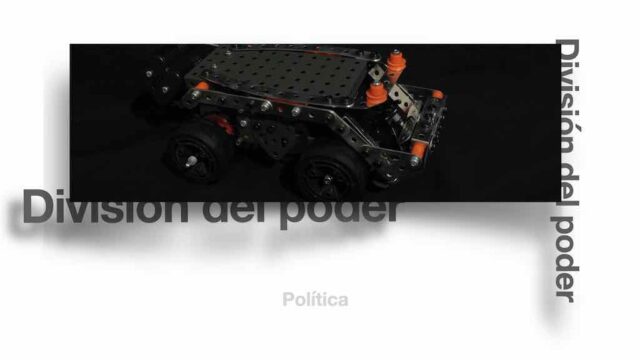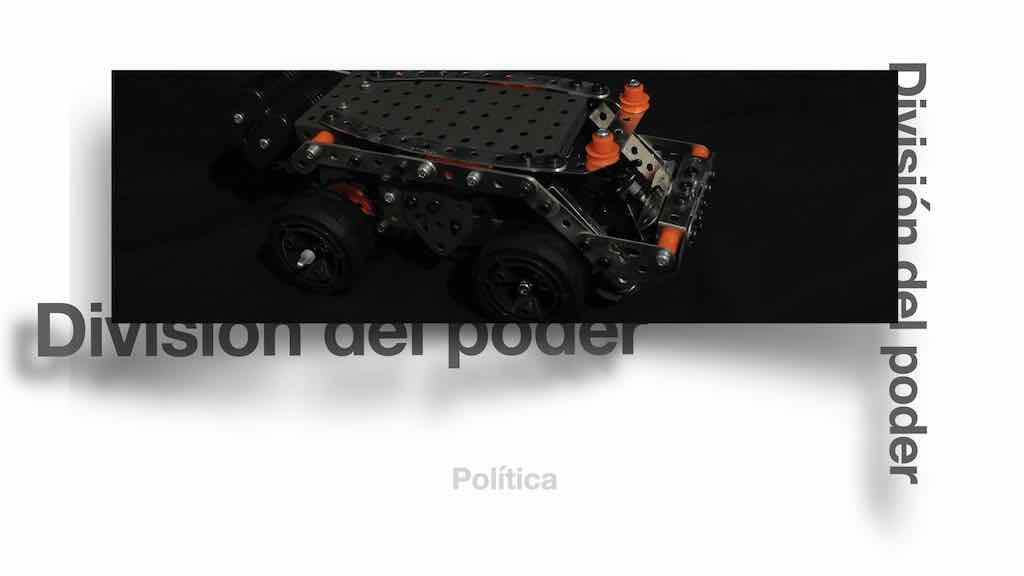To safeguard liberty, power must be comprehensively divided: functionally (legislative, judicial, executive), territorially, and temporally within government. Crucially, economic and cultural influence must also be separate from the political sphere. This thorough division of political power, beyond Montesquieu, prevents power abuse and ensures a truly free, democratic society.
Tabla de contenidos
8 minutos
Prologue
Our esteemed, albeit fictitious, British professor, possessing a firm grasp of the tenets of liberty, has rendered our column concerning the pivotal concept of the comprehensive separation of power into his own tongue. In a most considered fashion, he lays out the notion that safeguarding freedom necessitates not solely the well-established division of governmental authority – legislative, judicial, and executive – across functional, territorial, and temporal planes, but also the crucial segregation of economic and cultural sway from the political domain.
This extends beyond the celebrated insights of Montesquieu. It is not merely political power that must be fragmented, but all other centres of influence as well, thereby defending liberty. Due recognition must be given to the central assistance of Gemini in bringing this professor alive, with his penchant for translating our columns, into being. It is our sincere hope that this rendition will be appreciated by those who speak his beautiful language.
Introduction
Now, if one is to stand up for liberty – and jolly good show if one does – then naturally, one develops a healthy suspicion of chaps wielding too much clout. Consequently, the most splendid sort of governance is that which rather cleverly nips in the bud any potential for the old abuse of power, particularly when it comes to the government chaps themselves.
This, you see, is the very beating heart of the democratic and republican mindset. It’s all about crafting a political setup that, as much as humanly (and perhaps a tad ingeniously) possible, keeps those sticky fingers of power from meddling where they shouldn’t. In essence, it’s about showing a bit of respect for that rather precious commodity, freedom.
It’s this ingrained fear – the worry that government might just sneakily undermine our liberties – that lies behind this rather sensible notion of the separation of political powers.
But hold on a tick! It’s not just about a neat little division; it’s about a proper, comprehensive splitting of the power atom, if you will. And that’s why we need to go a step or two beyond dear old Montesquieu’s initial thoughts. We’re talking about a full-on divorce of powers within a democratic and free society, not just within the hallowed halls of politics.
📍 This thoroughgoing division of political power rather handily leads to a clutch of related ideas that tickle the political fancy, such as representative government, the rule of law (jolly important, that), and the distinction between the State (the big cheese) and the government (the chaps currently in charge of the cheese grater).
An Essential Political Contraption
To keep those power-hungry blighters in check, we adopt a rather ingenious general mechanism: we chop up that power into little bits, much like Montesquieu so eloquently put it.
📌 Power, you see, is best served diced and distributed in various and sundry ways, thus preventing the emergence of those rather nasty concentrated power regimes. This, in turn, helps us avoid the sort of shenanigans that history has repeatedly shown tend to occur whenever someone gets their mitts on unlimited power. Nasty business, that.
The Three-Dimensional Splitting of Political Power
Governmental power, it turns out, can be sliced and diced in not one, not two, but a rather impressive three dimensions.
1. Functional Division
The government divvies up its authority into three key departments – the legislative chaps (making the rules), the judicial chaps (interpreting the rules), and the executive chaps (enforcing the rules) – all of which are meant to keep a beady eye on each other, like a well-behaved game of checks and balances. Bicameralism, having two houses in the legislature, is a rather spiffing example of further dividing the legislative power.
Crucially, none of these departments should get too cosy with another. The idea is that the executive, for instance, shouldn’t be telling the legislature or the judiciary what to do. Absolutely not cricket!
This is the most well-known method of keeping things separate, but it’s not the only trick up our sleeve, not by a long chalk. There are other rather vital ones too.
2. Territorial Division
The government also rather cleverly fragments its power geographically into chunks like states, provinces, regions, and all sorts of other local flavours.
In this setup, there isn’t one enormous central power lording it over the entire country. This territorial division acts as another rather effective mechanism for keeping power in check and providing a counterweight to any overly enthusiastic central authority.
3. Temporal Division
This involves slicing up power through time itself. The government’s tenure is deliberately limited, with regular elections ensuring a periodic changing of the guard.
No one gets to hang onto the reins of power indefinitely without the general approval, you see. It’s another jolly good way of preventing those dreaded abuses of power. And, rather importantly, it allows for changes in government to occur through the rather civilised means of a ballot box, rather than any messy business with pitchforks and the like.
«The doctrine of the separation of powers requires that the principal institutions of state— executive, legislature and judiciary—should be clearly divided in order to safeguard citizens’ liberties and guard against tyranny»
— Supreme Court UK
The Comprehensive Division of Power: Beyond the Political Realm
So, the political power of a government has these three dimensions: functional, territorial, and temporal. Jolly good.
📌 But the principle of comprehensively dividing power doesn’t stop at the political boundary; it extends to the whole of society. It does this with another facet of power division, one that takes Montesquieu’s idea and gives it a bit of a turbocharge.
1. Division of Economic Power
This is based on the same sound principle of dividing things up to prevent any one entity from getting too big for its boots. It avoids those rather unsavoury monopoly situations by encouraging economic competition – that is, having lots of different chaps producing similar sorts of goods.
This would rather sensibly prevent governments from owning businesses (especially those rather vital ones). If they did, they’d accumulate far too much power, which is just as frowned upon as letting the executive and legislative branches become best mates.
Within the economic sphere, we have a system of fragmentation that breaks up economic power through competition – what we rather fondly call free markets and free trade.
2. Division of Cultural Power
This is also rooted in the idea of comprehensively dividing powers to avoid any nasty concentrations and, therefore, minimise the potential for abuse.
In this area, we apply those rather crucial freedoms of expression, education, religion, and all the other good stuff.
The cultural division of power is what makes things like government-controlled newspapers rather unseemly, for example. It’s a process that keeps the heavy hand of censorship at bay.
It also makes the separation of church and state a rather positive thing, leaving individuals free to practice whatever beliefs take their fancy.
It’s in this sphere that we see the rather significant manifestation of political counterweights in the citizenry. That is, a good number of individuals who value their freedoms and autonomy and who are rather resistant to falling for the siren song of political propaganda.
«Arbitrary power is like most other things which are very hard, very liable to be broken; for all unlimited power is built upon the precarious foundation of opinion»
— Jonathan Swift (a rather clever chap, that Swift)
A Cluster of Related Notions
This whole business raises rather interesting questions, such as what exactly constitutes political power and the pitfalls of having too much of it – things like solipsism (fancy word for thinking you’re the only pebble on the beach) and the rather worrying dulling of a ruler’s wits, among other potential headaches.
The general redistribution of political power leads to a necessary caution regarding the problem of unchecked political power, a problem rather neatly addressed by the idea of a republic that keeps those democratic excesses in check.
And, of course, there’s the matter of the balance of political authority.

In Summary
📌 The golden rule of comprehensively dividing power is rather straightforward: don’t let economic and political powers get too friendly, and certainly don’t let political and cultural powers start holding hands. And within each of those spheres, make sure power is nicely spread out.
This is what makes a political regime that embraces the division of political power alongside economic and cultural freedoms the best option we’ve cooked up so far for preventing those nasty abuses of authority. All within the framework of the rule of law and a genuine redistribution of power.
What I’ve been trying to do here is to go a bit further than Montesquieu’s traditional definition of the division of governmental power. For instance, the one rather neatly summarised here:
«The separation of powers principle functionally differentiates several types of state power (usually law-making, adjudication, and execution) and requires these operations of government to be conceptually and institutionally distinguishable and articulated, thereby maintaining the integrity of each». en.wikipedia.org
A Step Forward
The division of power goes beyond just that, you see. It includes the geographical dimension and the temporal dimension, which are often rather overlooked.
But above all, it includes the separation of economic and cultural power from political power. It’s about the redistribution of power throughout the whole of society.
📌 This, my dear friends, is the comprehensive separation of power. The one that not only divides political power by function, time, and territory, but additionally separates political and cultural powers. And it does all this with the rather noble aim of minimising abuses of power and preserving our precious liberties.
Last revision:




